Addressing Unmet
Medical Needs
Our Products
Our Products
Our product portfolio includes Acetadote® (acetylcysteine) injection for the treatment of acetaminophen poisoning; Caldolor® (ibuprofen) Injection, the first injectable treatment for pain and fever approved in the United States; Kristalose® (lactulose) for Oral Solution, a prescription laxative; Vaprisol® (conivaptan) Injection, for the treatment of hyponatremia; Vibativ® (telavancin) Injection, for the treatment of certain serious bacterial infections and complicated skin and skin structure infections; and Sancuso® (granisetron transdermal system) for the prevention of nausea and vomiting in patients receiving certain types of chemotherapy treatment.
Marketed
Acetadote®
Acetadote® (acetylcysteine) is our IV treatment for acetaminophen overdose, the leading cause of drug toxicity in the U.S. It was developed by Cumberland and was the first injectable product available to treat acetaminophen overdose available in this country. Though safe at recommended doses, acetaminophen can cause liver damage with excessive use.
Acetadote is used in the emergency department, the intensive care unit, and hospital inpatient setting to prevent or lessen liver damage from an overdose of acetaminophen, a common ingredient in many over-the-counter and prescription medications. Acetadote is FDA-approved for adult and pediatric use. It is free of EDTA as well as any other stabilizing, chelating, or preserving chemicals and has become a standard of care for the treatment of this potentially life-threatening condition.
For more information, including full prescribing and important safety data visit:
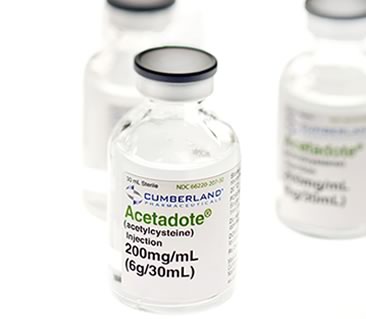
Marketed
Caldolor®
Caldolor® (ibuprofen) was the first injectable therapy approved in the United States for the treatment of both pain and fever. It is indicated in adults and pediatric (newborns) as a sole treatment for the management of mild to moderate pain; as an adjunct to reduce the use of opioids in the management of moderate to severe pain; and for the reduction of fever.
Caldolor provides distinct benefits to physicians treating post-operative pain. In addition to working peripherally at the site of trauma, it also acts centrally to blunt the perception of pain. Clinical trials have shown that Caldolor provides beneficial anti-inflammatory properties while reducing fever, pain, and opioid consumption. Cumberland supplies Caldolor in two presentations – a vial that requires dilution before use and a pre-mixed bag requiring no dilution. The bag presentation is the first and only FDA-approved ready-to-use injectable ibuprofen.
For more information, including full prescribing and important safety data visit:
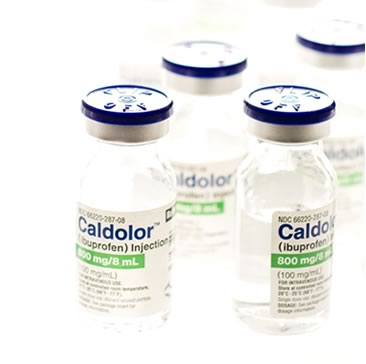
Marketed
Kristalose®
pre-measured dose. A unique, dry powder crystalline formulation of lactulose, Kristalose is designed to enhance patient compliance in the treatment of acute and chronic constipation. Kristalose dissolves quickly in 4 oz. of water, offering patients a virtually taste-free, grit-free and essentially calorie-free alternative to lactulose syrups. Kristalose provides a prescription alternative for many patients unable to find relief with over-the-counter laxatives. Additionally, there are no age limitations or length of use restrictions for Kristalose. For more information, including full prescribing and important safety data visit:
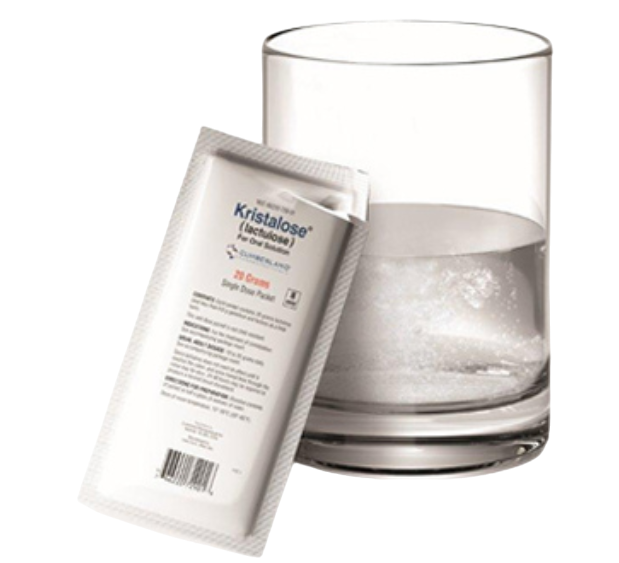
Marketed
Vaprisol®
Vaprisol® (conivaptan) is the first and only intravenously administered vasopressin receptor antagonist, a class of pharmaceuticals developed for the treatment of euvolemic and hypervolemic hyponatremia. Vaprisol is indicated to raise serum sodium in hospitalized patients with euvolemic and hypervolemic hyponatremia by reducing excess water in the body and regulating the water/sodium balance.
Hyponatremia, an imbalance of serum sodium to body water, is the most common electrolyte disorder among hospitalized patients. It can be associated with a variety of critical care conditions including congestive heart failure, liver failure, kidney failure, cancer, and pneumonia. When partnered with fluid restriction, Vaprisol can provide a positive response in water/sodium balance within 24 hours after beginning therapy.
For more information, including full prescribing and important safety data visit:
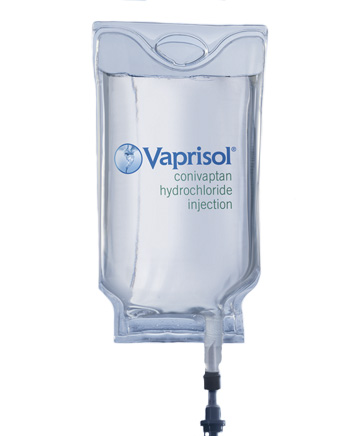
Marketed
Sancuso®
Sancuso® is a unique patented, FDA-approved oncology support product. It is indicated for the treatment of nausea and vomiting in adults receiving chemotherapy. The product is designed as a transdermal system, or skin patch, that delivers granisetron, its active ingredient, through a thin layer of adhesive that attaches the patch to the skin. The medicine is then released continuously into the bloodstream for up to five consecutive days. It is the only transdermal patch in its market.
For more information, including full prescribing and important safety data visit:

Marketed
Vibativ®
Vibativ® (telavancin) is an FDA-approved injectable antibiotic used in the treatment of certain serious bacterial infections including hospital-acquired and ventilator-associated bacterial pneumonia, as well as complicated skin and skin structure infections. This lifesaving antibiotic features a dual mode of action designed to treat difficult Gram-positive bacterial infections, including MRSA and those that are classified as multidrug-resistant. Additionally, clinical data has demonstrated the superior ability of Vibativ to penetrate lung tissue – an important benefit when treating secondary bacterial infections, such as those seen in COVID-19 patients.
For more information, including full prescribing and important safety data visit:
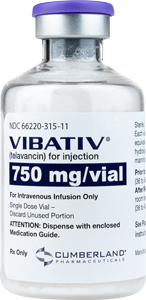
Building a Pipeline of Differentiated Products
In addition to our portfolio of FDA-approved brands, we continue to advance our pipeline of new product candidates. All part of our ifetroban program, our development candidates have the potential to help multiple patient populations and are designed to treat conditions for which there is currently no FDA-approved pharmaceutical treatment.
Phase 2
Ifetroban
Ifetroban oral capsule is being developed by Cumberland for the treatment of idiopathic pulmonary fibrosis (IPF), the most common form of progressive pulmonary fibrosis (PPF). We received clearance for our Investigational New Drug (IND) Application from the FDA to commence studies evaluating oral ifetroban for the prevention and treatment of pulmonary fibrosis. We have completed preclinical studies and a Phase II clinical study is underway. Preclinical studies using three models of lung fibrosis demonstrate ifetroban as a promising therapy to investigate with the goal of improving outcomes in patients with IPF. Currently approved therapies for IPF slow the decline in lung function, however they do not provide a long-term cure by halting or reversing disease progression. Additionally, their use is associated with significant side effects, limiting their clinical application for IPF patients. Therefore, there remains a critical need for tolerable and effective therapeutics to treat IPF. Cumberland aims to determine whether oral ifetroban, as an additive to currently approved medications, is a more effective combination therapy compared to matching placebo in patients with IPF.
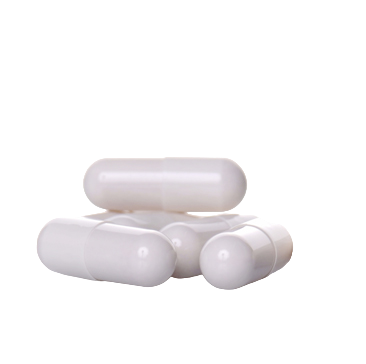
Phase 2
Vasculan®
Vasculan® (ifetroban) oral capsule is being developed by Cumberland for the treatment of systemic sclerosis (SSc), also known as scleroderma. It is a rare autoimmune disorder that results in a thickening of the skin and internal organs. With pulmonary disease emerging as the major cause of death in SSc patients, preclinical studies have found that ifetroban can prevent cardiac and lung fibrosis. Following FDA clearance of our IND, we have initiated a Phase II study in SSc patients.
SSc affects 2.5 million people worldwide and does not yet have a proven curative therapy. Although several medications that suppress the immune system are used to slow progression of the disease, there is no universally effective treatment to improve the function of affected internal organs. Hence the treatment of SSc remains an unmet medical need.
Phase 2
Dyscorban®
Dyscorban® (ifetroban) oral capsule is being developed by Cumberland for the treatment of the cardiomyopathy associated with Duchenne muscular dystrophy (DMD). Preclinical studies demonstrated that ifetroban improved cardiac function, reduced cardiac fibrosis and increased survival in multiple animal models. These encouraging findings compelled us to develop a clinical program to evaluate ifetroban for the treatment of DMD cardiomyopathy. The FDA has cleared the IND for this program, and a Phase II clinical trial in DMD patients has been initiated.
DMD is a rare, fatal, genetic neuromuscular disease and is characterized by the progressive loss of muscle which results in deterioration of the skeletal, heart, and lung muscles. This deterioration leads to decreased mobility resulting in wheelchair dependency. DMD affects 1 in 3,500-5,000 male children, making it the most common childhood muscle disease. Cardiomyopathy is the leading cause of death in these DMD patients – and with no effective treatment, this condition remains an unmet medical need.
